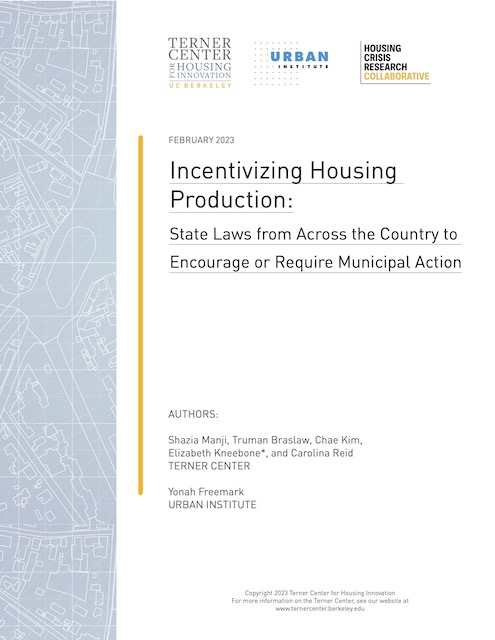A new paper from the Urban Institute and the University of California, Berkeley, is further proof, if anyone needs it, that more planning means less housing. Unfortunately, the authors of this paper failed to get this, as the paper praises states that have the most supposedly pro-housing laws even though those are the very states that have least affordable housing.
Click image to download a 1.6-MB PDF of this 30-page report.
A map on page 6 of the report shows how many laws various states have passed that “incentivize housing.” California, Oregon, and Washington lead the way with more than 10 such laws each. In fact, appendix A reveals that California has passed 56 such laws, far more than any other state. Needless to say, California has the least-affordable housing in the nation.
Oregon is next with 25 such laws, while Washington has 17. Both of these states are also pretty unaffordable. Meanwhile, shame on Indiana, North Carolina, and Texas, which have zero such laws. Of course, they also have some of the nation’s most affordable housing despite being among the fastest-growing states.
The authors of the paper include Shazia Manji, who has a master’s degree in city planning; Truman Braslaw, who has a master’s degree in public policy as well as a law degree; Chae Kim, who has a master’s in urban planning; Carolina Reid, an associate professor of urban planning; Elizabeth Kneebone, who has a master’s degree in public policy; and Yonah Freemark, who has a PhD in urban planning.
Typical of urban planners, these writers make the mistake of judging laws and plans by their intentions, not by their results. Urban planners made California housing expensive by drawing urban-growth boundaries around cities in the 1970s and then never expanding those boundaries. They then vaguely blamed expensive housing on “local land use regulations, such as zoning policy,” meaning, of course, single-family zoning, which existed in California for five decades before housing became expensive. They then praise legislators for creating all sorts of programs aimed at making housing more affordable even though none of those programs worked.
Of course, the real goal of urban planners is not to make housing affordable but to make it dense. To do that, they have to make housing unaffordable. The laws praised in this paper won’t make housing more affordable, but it will make it dense, which satisfies the planners even if it harms the public in general.









When I bought my first house it was affordable because it needed work and the owners bought another house that needed less work. Somewhere along the chain someone probably bought a new home, that did not need any work.
There was no Urban Growth Boundaries or System Development Fees and lots were going for around $10,000 or less and homes for around $20,000 or more.
In the same neighborhood (40 years later), older homes that need work are torn down to build new homes or they are bought and completely and sometimes cheaply renovated and sold for 1/3 to twice as much as they were bought for.
If someone wants to build a new home they are starting with a 3 or $400,000.00 fixer to tear down and if it is a older home they have to remove all the building to go to a resell center. Then on top of that the permits and system development fees and mandates can run up to $100,000.00 to start.
Thanks to Politicians Urban, Planners and Urban Growth Boundaries.
As a fan of fantasy/rpg I always imagined that we would have cities in Mountains. Think Minas Tirith from Lord ofnthe Rings.
https://m.media-amazon.com/images/W/IMAGERENDERING_521856-T1/images/I/610RggoSRtL.jpg
In essence a large mountain side southern exposure would house tiered infrastructure to support housing, etc.
Much like step terraces of China rice and tea plantations.
https://encrypted-tbn0.gstatic.com/images?q=tbn:ANd9GcQJAC2SAFLn-hEosejct0iRyhKpVxfukUuyOQ&usqp=CAU
A mountain would house dozens layers with landfill , each layer would encompass in pattern development, next layer parks and gardens, then housing, with adjacent layers. Til top was sightseeing, recreation. Transportation would be by funicular or ski ramp as well as walking and small micro vehicles.
New cities for places with mountainous terrain, Japan, Colorado, Switzerland….
https://s3.amazonaws.com/moonup/production/uploads/1672320214692-noauth.jpeg
Starving Parisians wander the streets, unable to obtain food because their cars have been taken away
https://twitter.com/EmmanuelSPV/status/1645086833762508802?s=20